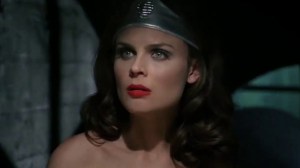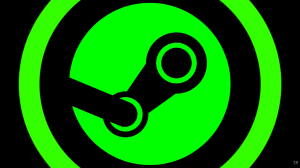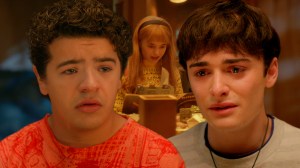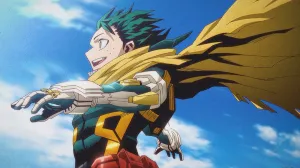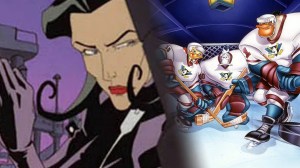Throughout her career, musician Chelsea Wolfe has covered a lot of ground, as her studio albums have blended together neo-folk, doom metal, and industrial sounds with ethereal vocals, earning her a passionate following for these majestic musical landscapes. Her unique artistic sensibilities have seen shows like Utopia, American Horror Story, and The Magicians incorporate her tracks, as well as the Season 4 trailer of Game of Thrones famously using “Feral Love” from her album Pain Is Beauty. Despite how much she has already accomplished in her career, the upcoming A24 Films release from writer/director Ti West X marked a new venture for Wolfe, as she co-composed the film’s score with Tyler Bates.
Videos by ComicBook.com
The film is described, “In 1979, a group of young filmmakers set out to make an adult film in rural Texas, but when their reclusive, elderly hosts catch them in the act, the cast find themselves fighting for their lives.”
ComicBook.com caught up with Wolfe to talk her interest in the horror genre, collaborating with Bates and West, and future projects.
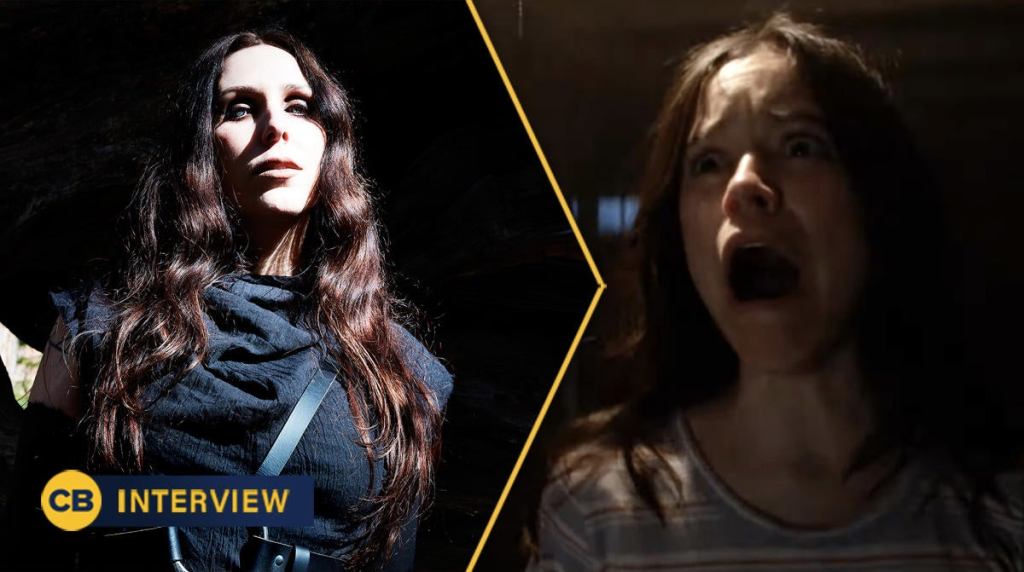
ComicBook.com: It’s funny because I was looking at the interview I did with you just over a year or so ago for DC Comics’ Sonic Metalverse where you mentioned, “I really wish I could take a year off and spend a year working on writing music for a project,” and, sure enough, 15 months later, here we are talking about X.
Chelsea Wolfe: I know, I feel like, in a way, that sort of manifested it because it was not that long after that, Tyler hit me up and asked if I wanted to do this. I don’t know if he had read that or if he just had that in his mind, but I was like, “Cool, I guess it’s happening now.”
At the time, I think I mentioned you should do music for The Crow and then you said, “Oh, by the way, I did write a song for The Crow and it turned into ‘Diana’ for the Sonic Metalverse.” So you and I, I think, are all about manifesting your destiny and finding these bizarre connections.
And I’m like, what else can we manifest for the next thing?
What I thought was interesting at the time was, in my mind, I picture a lot of your music in that darker, more horror-oriented realm, and you said you wanted to score maybe a sci-fi or fantasy project. Just in general, are you typically a horror fan? Do you have much of a connection or passion for that genre?
I do, I love films that have a crossover genre. Maybe something like The Witch, which is a horror film, but it’s not overly gory and there’s definitely some spiritual and psychological elements to that film as well. So I think something like that would maybe sum up the kind of horror film that I typically go to. But when I was younger, I was maybe into horror films more. I think, as I’ve gotten older, I’m just very sensitive, so a lot of violent movies and gory movies, I just tend to not watch because they stay with me for way too long.
So this movie was interesting because I think it is a bit gory, but it also has a really interesting storyline and a lot of layers that you can really dig into as you watch it more and more and I definitely got as I was reading the script and just working on the scenes.
You mentioned Tyler reaching out and I’m a huge fan of Ti West’s films, so this movie was on my radar. Then, when the credits rolled, to realize that you had done the music with Tyler, I was like, “How did that happen?” So, how did that happen?
Essentially Tyler just hit me up, we had worked on the song “Diana” together for that DC soundtrack, as you know, and that went really well. We just became friends and talked about collaborating more in the future, and he had gotten this opportunity to do the X score. I think he basically went to Ti and was like, “Hey, I want to bring in this artist, Chelsea Wolfe. But I don’t want her to just be a guest vocalist. I want her to actually collaborate with me and be part of the score.” Ti gave his stamp of approval to do that, so we just started working on it, mostly remote, unfortunately, because of the pandemic.
But we were able to work together a few times in Tyler’s studio in Los Angeles and that was some of the best stuff, obviously being in the same room together. I also invited my main collaborator Ben Chisholm to work on it with me because, while I knew I could bring a lot to it by myself, Ben is usually the one that will take vocals that I’ve done and process them through pedals or just strange effects and bring another layer to them. I felt like that would serve this film really well. So it was mainly Tyler and I, but Ben really brought a lot to the table, as well.
Since it’s this 1970s Texas vibe, after you got the script and were processing it and thinking about your approach, were there specific touchstones or inspirations either cinematically or musically that you first went to in hopes of motivating the direction you wanted to pursue or was it mostly just the script?
For me, it was the script. I had to let go of the idea that it was a period piece of sorts, because I was starting to be like, “’70s music, that’s not really my forte.” That’s not really what I usually go for with my own music. So, I don’t know, I think when it came to specific pieces, for one of the scenes where they were filming, the film that they were making there, Tyler and Ben would take over in that realm when it came to making porn music, basically, from the era.
I would step back from pieces like that. I tended to just focus more on the vocals and giving each character, at least a couple of the main characters, their own theme and feelings and certain vocalization. For me, it was very, very vocal-driven. Obviously, while it was set in the ’70s, my vocals were more of just a textural mood element, in my opinion, so it didn’t really matter what time it was set in. I was just trying to serve the characters well in that way.
What is so interesting, and you touched upon it, is when that final song starts playing, your voice is very recognizable, as a fan of your music. But, as you mentioned, your typical songwriting sensibilities or your production value doesn’t feel like the ’70s, it doesn’t immediately feel like it fits in that time period, necessarily. It’s interesting to hear you talk about it because I wondered how you navigated that, whether you thought, “Do I try to emulate the ’70s or do I allow my voice to be applied to what Ben and Tyler were doing?”
Well, for that specific song [“Oui Oui Marie”], that’s even more of a mind f-ck because that song is from 1918. That’s like, “Okay, do I bring this to the ’70s or do I just bring it to my own world?” which is what I did. I was asked to cover it for the film, so I knew that was something I had to do. Basically, we did a version that was a little more true to the original, with piano and just more, I don’t know, of the time, that’s a song that the main character, the elder woman in the film, would’ve danced to back in her young days. That’s why that is in the film. We did that cover, the more “normal cover.”
Then I just was inspired one night and I figured it out on guitar and did my own version of it. I think I just labeled it “Acoustic Freak Version” or something and sent it off like, “Hey, if you want to use this version, go ahead. If not, I totally get it. It’s not true to the original very much, but this is what I came up with.” They ended up digging it and wanting to use it, so it’s cool to have both versions in there.
Now that you mention it, I’m now disappointed that there’s not a parenthetical for the song “Acoustic Freak Version.” When it comes to your own music, your own albums, do you approach them as, “I want to make an album and I want it to have this theme and I want to write songs to this theme,” or is it more, “I’ve recorded X amount of songs or have ideas for X amount,” so once you put them all together, they just naturally fit the vibe of your headspace at that time?
It’s definitely more the latter. I find that I do always go into a new album thinking, “This is what the album’s going to be.” I have it all worked out in my head and then as I start working on it more and more, it just becomes its own entity and tells me what it wants to be, which is definitely what’s happening now because I’m currently recording a new album that’s years in the making because of COVID and stuff like that. Just having to stretch it out over a long period of time. Also, I’ve found that time is actually a gift, in certain ways, to the music, because the songs from demo to where they are now, which is almost finished, is such a wild evolution.
I had no idea that they would go in this direction, but I’m really excited about it. I’m really grateful that they had the time to develop as I was doing my own internal work and then naturally infusing that into the songs. And some of them, I completely rewrote the lyrics for, because I just didn’t feel like I connected to them anymore. Basically, I do go into albums having an outline either in my head or written down of what I want it to be or what I think it’s going to be, but it usually transforms and ends up being something at least slightly different if not wildly different.
In that regard, you have a lot more freedom with your own albums, then with X, obviously it wasn’t frustrating, but what was it like to have a little bit more of a rigid structure or an outline of music having to fit this film? Having other collaborators and having to get approval from Ti, or was it almost like, with those variables off the table, you were allowed to focus or hone in on what you specifically were bringing to the music?
I guess a little bit of both. We started just by creating a palette of sounds for them to work with, which, for me, involved a lot of these guttural sounds and demonic screams and little things. There were certain assignments I was given. Like I said, I was given the task of covering “Oui Oui Marie” and I was also given the task of doing things like creating a creepy giggle or surprised sounds and things like that, so that was really interesting. Basically, if anyone was at my house at the time, I would be like, “I’m going to go away for a few hours because I need to be completely alone.” I would honestly really tap into some deep and, I guess, I don’t know another word to use except for the word “wild” part of myself and just let that go into the microphone and sent all this stuff off to them and would just see what they picked.
At first, I was nervous because this is my first time doing an official film score. But at the same time, I was like, “I’m at a place in my life where I want to do things that are truly meant for me to do and I don’t want to force myself into anything.” So I was like, “Hey, if they don’t like what I’m doing and they say, ‘It’s not working out.’ I’m totally okay with that. And they’ll find someone that is right for it.” I was just totally being myself and, just like I said, letting loose, these really deep and ancient sounds that I was finding within myself and approaching it in almost a ritualistic way and then giving those sounds off to them. So I started with that.
As we got into it more, obviously we had to go scene by scene, which was really new for me. I’d never done that before where you’re actually watching the scene while making sounds and vocalizations and singing along to it. So that was a really cool learning experience. When I was at Tyler’s doing that, he would just suddenly hand me a cowbell and a stick or something and be like, “Hey, just f-ck with this.” And I was like, “Okay,” so it was an experimental process, but it was also very focused. Like you said, we had to make sure that certain scenes had certain feelings and some were more intense, some were very, very subtle.
You sent screams and giggles and things like that, so some of those would lend themselves a little bit more organically to the score and the music, but since obviously Mia Goth is playing two characters, she has multiple layers to that identity. Was your voice also used in the sound design or was it just for the music?
To be honest, I haven’t seen the final cut yet. I will next week, so I’m not sure exactly what ended up getting used or not. But in the cuts that I did see before, it did seem like it was a little bit of both. Maybe it’s not sound design as much as just … I guess it was probably more part of the score, but there are aspects of the score that don’t have much other than just maybe a few layers of vocals.
Now that you have taken this year, you’ve done a score like you said you wanted to do, did this now scratch that itch and you’re like, “All right, I can cross that off the list and I can look towards what the next super exciting, ambitious, challenging project is,” or was it, “I absolutely love this. I can’t wait to do more of it,”?
I would love to do more of it, for sure. I think, like I said, this was a big learning experience. I learned a lot from Tyler and even just down to the software that you need to actually do this stuff and be looking at the scene while you’re recording. Just also learned what is maybe a little more predictable and what is something that is more innovative. I think he’s a really innovative artist in this realm, in the realm of film scoring, so it’s just a real pleasure to work with him and to see him work and to learn from him. I would love to try something in the future, whether it’s on my own or more with my writing partner, Ben, I think that we would be a great team to do more film scoring work, but, for now, I’m definitely focused on this new album.
I’m just about finished with it and I really want to not overload my plate in the future. I’ve tended to do that in the past, and I think something a lot of people learned during the pandemic was to maybe take things a little bit more slowly and really just focus on projects that excite you. Obviously, if the right project came along, I would love to do it. I would be super happy to do that, but I’m focusing on my new album for now, because I really want to create some stuff for that.
You have your own album coming out and last year you worked with Converge and you’re doing live shows with that, which is super cool. And I wonder, that was called “Bloodmoon: I,” was that conceived of as you’re going to work with Converge again and put out a series of these? Was that more of Converge’s thing? Are there more Bloodmoon albums in the works?
Not currently in the works. I think there’s possibilities of it, there’s possibilities of me being involved or not depending on the timing or whatever it needs to be. I don’t think there’s any rush to do that because we haven’t even played any shows for it yet. But, yeah, I think there’s definitely possibilities of more and that was definitely done side by side with the X soundtrack. So I always like to think that the sounds that I was coming up with for X ended up on the Bloodmoon stuff, too, because I was really pushing my voice and challenging myself. So I think that served both projects really well.
Since you’ve collaborated with a variety of musicians, but Converge was a little bit different because it was that whole album, is there another artist or band that you would just really love to create an entire album with?
I don’t think so. To be honest, I think it’s maybe the polar opposite, which is that I would really like to do some stuff that’s completely by myself because I don’t typically do that. “Oui Oui Marie,” that Acoustic Freak Cover, was an example of that, where I just went out on my own on that one and just did it and it was really fun. I think I’d like to do maybe an album like that at some point where it’s just, I have the freedom to just go out by myself. I’d really like to find places with natural reverb, so maybe that’s what we can manifest together this time.
Absolutely.
I would love that. There’s definitely spots up where I live out in the mountains that I have in mind. But yeah, I would love to find spaces that have a really cool, natural sound and go do recordings of songs in these different spaces, because I’ve done so much in my writing room at home. Obviously, a lot of us have been working from home, which I’m super grateful for, but I think I’m ready to just be in some new spaces and get inspired by some new spaces.
I can’t wait, I look forward to your new album coming out. I’m in Seattle, I don’t think there’s any Bloodmoon shows on the horizon, but we’re in a slightly better place talking to you now in 2022 than when we talked in December of 2020 and shows are actually happening again. So who knows? Maybe the next two years I’ll actually get to catch you on tour again.
Yes, that would be awesome. I’m definitely already starting to plan for some stuff for probably a year from now, so maybe I’ll see you then.
And hey, earlier this month one of the producers on The Crow said to expect some updates on the director and casting so, just like Eric Draven, The Crow is back from the dead.
Oh, my God. I didn’t even know that. That’s exciting.
Keep your eyes out, and if nothing else happens, you’ll end up having another song that you can repurpose.
Yes, exactly.
X hits theaters on March 18th and the X soundtrack will be released on March 25th.
Chelsea Wolfe and Converge will be performing Bloodmoon on April 9th at Roadrunner in Boston and on April 10th at Brooklyn Steel in New York City. Stay tuned for updates on Wolfe’s future projects at Sargent House.
This interview has been edited for length and clarity. You can contact Patrick Cavanaugh directly on Twitter.

